Unit 9 Can you come to my party 第2课时 考点讲解(26张PPT)
文档属性
| 名称 | Unit 9 Can you come to my party 第2课时 考点讲解(26张PPT) |
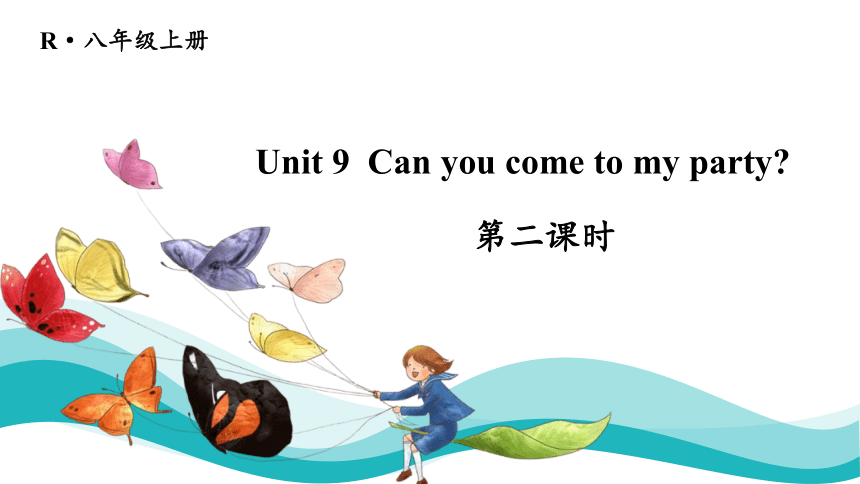
|
|
| 格式 | pptx | ||
| 文件大小 | 2.8MB | ||
| 资源类型 | 试卷 | ||
| 版本资源 | 人教新目标(Go for it)版 | ||
| 科目 | 英语 | ||
| 更新时间 | 2021-07-20 00:00:00 | ||
图片预览

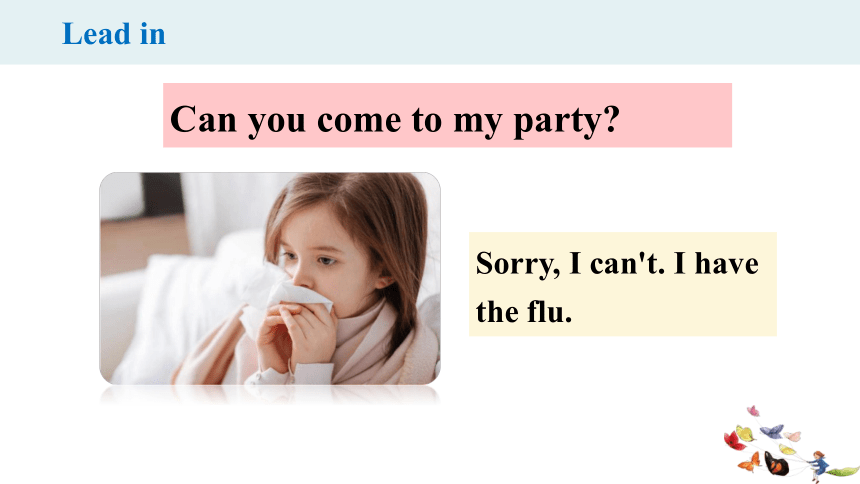
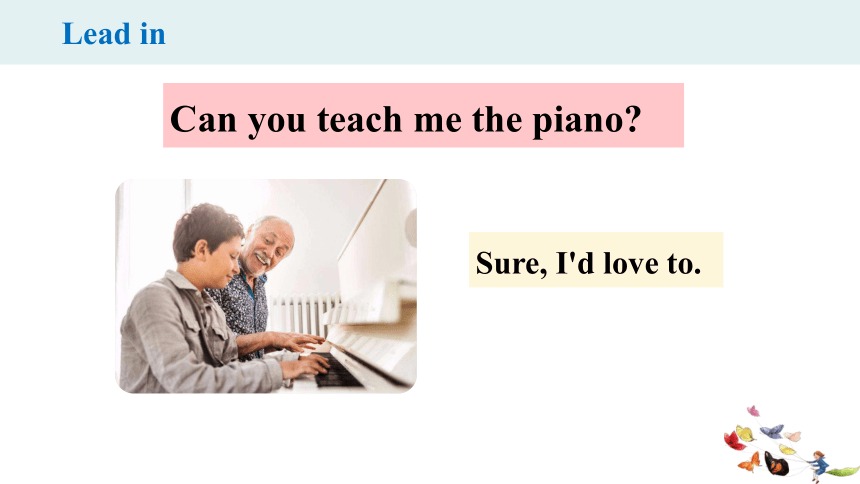
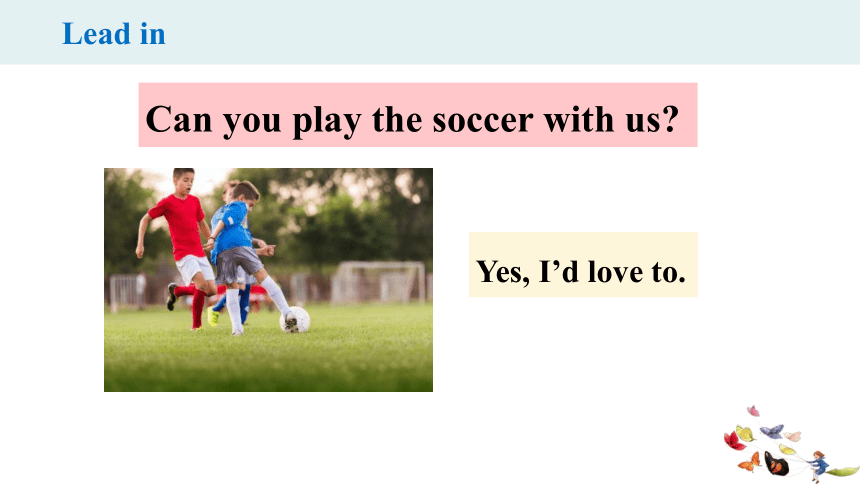
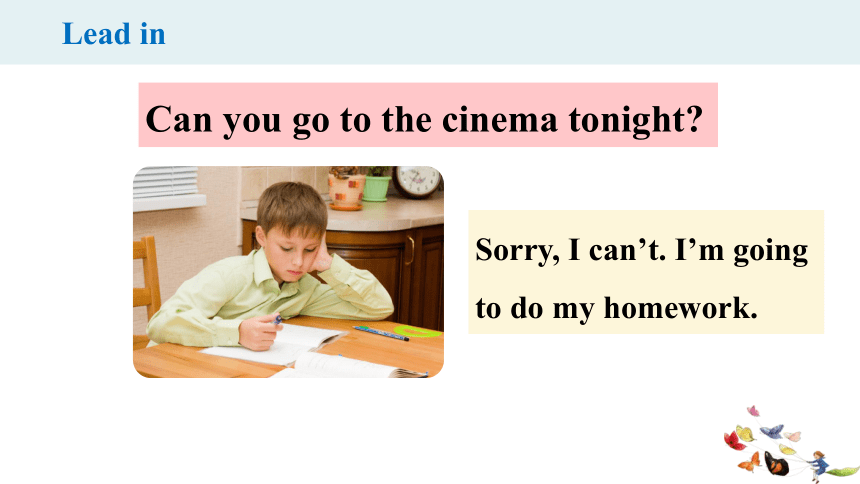
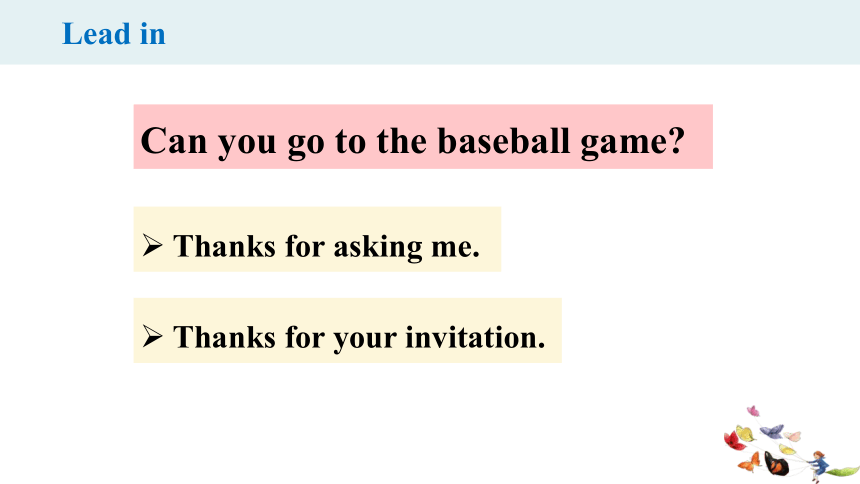
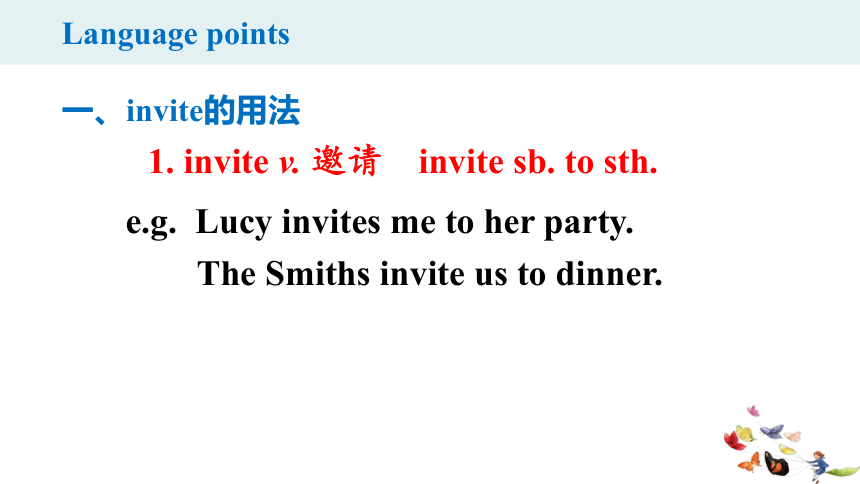
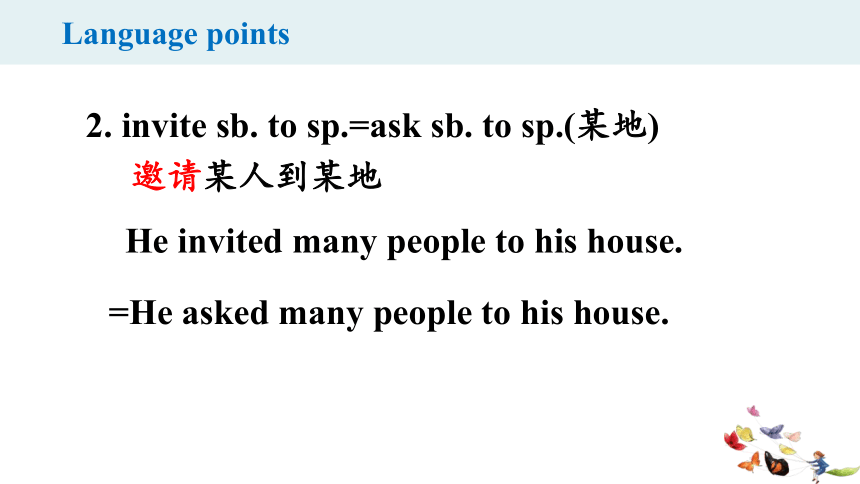
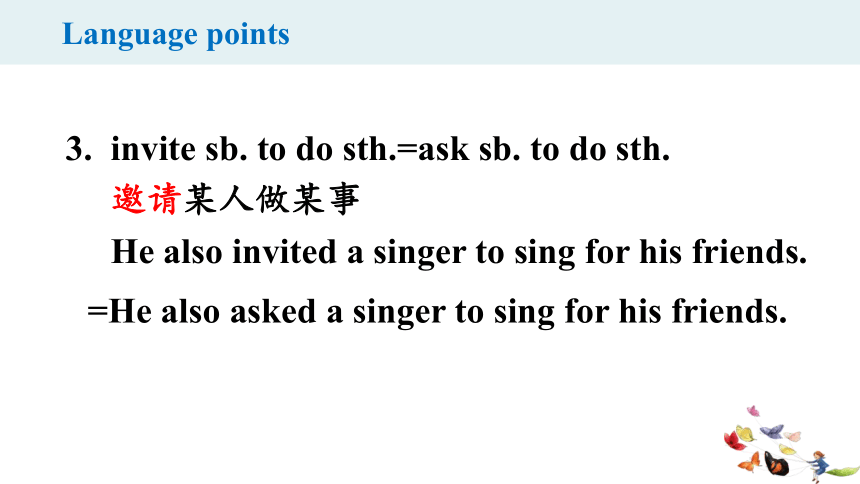
文档简介
Unit 9 Can you come to my party?
第二课时
R·八年级上册
Lead in
Can you come to my party?
Sorry, I can't. I have the flu.
Lead in
Can you teach me the piano?
Sure, I'd love to.
Lead in
Can you play the soccer with us?
Yes, I’d love to.
Lead in
Can you go to the cinema tonight?
Sorry, I can’t. I’m going to do my homework.
Lead in
Can you go to the baseball game?
Thanks for asking me.
Thanks for your invitation.
Language points
e.g. Lucy invites me to her party.
The Smiths invite us to dinner.
1. invite v. 邀请 invite sb. to sth.
一、invite的用法
Language points
2. invite sb. to sp.=ask sb. to sp.(某地)
邀请某人到某地
He invited many people to his house.
=He asked many people to his house.
Language points
=He also asked a singer to sing for his friends.
3. invite sb. to do sth.=ask sb. to do sth.
邀请某人做某事
He also invited a singer to sing for his friends.
Language points
4. invitation n. 邀请,邀请函
e.g.发出邀请
接受邀请
辞谢邀请
感谢你的邀请!
make an invitation
accept an invitation
decline an invitation
Thanks for your invitation!
Language points
5. an invitation to sp. /to do sth.
去某地/做某事的邀请
an invitation to the party
an invitation to go to the summer camp
Let's talk
Thanks for your invitation, but I have to go to the doctor.
Hey, Lily. Can you go to the movies on Saturday?
Language points
情态动词有:
may/might, can/could, must, have to,
shall/should, will/would, ought to,
need, dare, used to
二、情态动词
Language points
1. 不能独立作谓语,只能和动词原形一起构成谓语,
表示说话人的语气和情态。
2. 没有人称和数的变化。 (have to除外)
3. 否定形式:在其之后加not (have to除外)。
疑问形式:情态动词提到主语之前 (have to 除外)。
Language points
都可表示“许可” 。may用于较正式、
客气的场合,而can比较口语化。
You may/can sit here.
The policeman says you can’t park here.
1. can/may
Language points
(2) May/Can I/we…? 表示征询对方许可。
Can you…? 表示请求。
— May I use your phone?
— Yes, you can. / Yes, please.
No, you can’t. / No, you mustn’t.
Let's talk
Sure, here you are.
May I use your pen?
Language points
Mr Read looks pale. He may be ill.
(事实上的可能)
Mr Read is in poor health. He can be ill
at any time. (逻辑、理论上的可能)
(3) 都可表示“可能性”
肯定句
Language points
否定句
This news may not be true. (也许不 = might not )
This news can’t be true. (不可能 = couldn’t)
疑问句
Can this news be true?(=Could)
≠May this news be true?
Language points
have to 后接动词原形;have to有人称、数和
时态的变化, 其第三人称单数形式为has to,其
疑问形式和否定形式要借助于助动词do或does
来完成。
2. have to的意思是“必须、不得不”, 往往
强调由于客观原因而必须做某事。
Language points
(1) 这4个情态动词没有人称的变化,而have to有,
它的第三人称单数为“has to” 如:
He should study hard.
He has to study hard.
3. 情态动词“have to”与其他的情态动词如 “can”,
“may” “must” 和 “should” 不同。
Language points
例: 他能和我们一起去吗?
他不能和我们一起去。
(2) 这4个情态动词在一般疑问句中将它们放在
句首,在否定句中直接在他们后边加not即可。
Can he go with us?
He can’t go with us.
而“have to”要加助动词do , does或did才可能
完成其疑问句、否定句。
Language points
I don’t like this TV set. I must buy a new one.
This TV set doesn’t work. We have to buy a new one.
4. must/have to
must表示主观“必须”;have to表示客观
需要,即“不得不” 。
Practice
— Can you come to my party?
— I’m not sure. I might have to help my mom.
2. He has to study.(改为一般疑问句)
______ he ______ to study?
1. —你能参加我的晚会吗?
—我不确定。我可能得帮助我妈妈。
Does
have
Class summary
Unit 9 Can you come to my party?
1. invite
invite sb. to sp.=ask sb. to sp.(某地) 邀请某人去某地
(2) invite sb. to do sth.=ask sb. to do sth. 邀请某人做某事
invitation to sp. /to do sth. 去某地/做某事的邀请
2. 情态动词
may/might, can/could, must, have to, ...
Thank you!
第二课时
R·八年级上册
Lead in
Can you come to my party?
Sorry, I can't. I have the flu.
Lead in
Can you teach me the piano?
Sure, I'd love to.
Lead in
Can you play the soccer with us?
Yes, I’d love to.
Lead in
Can you go to the cinema tonight?
Sorry, I can’t. I’m going to do my homework.
Lead in
Can you go to the baseball game?
Thanks for asking me.
Thanks for your invitation.
Language points
e.g. Lucy invites me to her party.
The Smiths invite us to dinner.
1. invite v. 邀请 invite sb. to sth.
一、invite的用法
Language points
2. invite sb. to sp.=ask sb. to sp.(某地)
邀请某人到某地
He invited many people to his house.
=He asked many people to his house.
Language points
=He also asked a singer to sing for his friends.
3. invite sb. to do sth.=ask sb. to do sth.
邀请某人做某事
He also invited a singer to sing for his friends.
Language points
4. invitation n. 邀请,邀请函
e.g.发出邀请
接受邀请
辞谢邀请
感谢你的邀请!
make an invitation
accept an invitation
decline an invitation
Thanks for your invitation!
Language points
5. an invitation to sp. /to do sth.
去某地/做某事的邀请
an invitation to the party
an invitation to go to the summer camp
Let's talk
Thanks for your invitation, but I have to go to the doctor.
Hey, Lily. Can you go to the movies on Saturday?
Language points
情态动词有:
may/might, can/could, must, have to,
shall/should, will/would, ought to,
need, dare, used to
二、情态动词
Language points
1. 不能独立作谓语,只能和动词原形一起构成谓语,
表示说话人的语气和情态。
2. 没有人称和数的变化。 (have to除外)
3. 否定形式:在其之后加not (have to除外)。
疑问形式:情态动词提到主语之前 (have to 除外)。
Language points
都可表示“许可” 。may用于较正式、
客气的场合,而can比较口语化。
You may/can sit here.
The policeman says you can’t park here.
1. can/may
Language points
(2) May/Can I/we…? 表示征询对方许可。
Can you…? 表示请求。
— May I use your phone?
— Yes, you can. / Yes, please.
No, you can’t. / No, you mustn’t.
Let's talk
Sure, here you are.
May I use your pen?
Language points
Mr Read looks pale. He may be ill.
(事实上的可能)
Mr Read is in poor health. He can be ill
at any time. (逻辑、理论上的可能)
(3) 都可表示“可能性”
肯定句
Language points
否定句
This news may not be true. (也许不 = might not )
This news can’t be true. (不可能 = couldn’t)
疑问句
Can this news be true?(=Could)
≠May this news be true?
Language points
have to 后接动词原形;have to有人称、数和
时态的变化, 其第三人称单数形式为has to,其
疑问形式和否定形式要借助于助动词do或does
来完成。
2. have to的意思是“必须、不得不”, 往往
强调由于客观原因而必须做某事。
Language points
(1) 这4个情态动词没有人称的变化,而have to有,
它的第三人称单数为“has to” 如:
He should study hard.
He has to study hard.
3. 情态动词“have to”与其他的情态动词如 “can”,
“may” “must” 和 “should” 不同。
Language points
例: 他能和我们一起去吗?
他不能和我们一起去。
(2) 这4个情态动词在一般疑问句中将它们放在
句首,在否定句中直接在他们后边加not即可。
Can he go with us?
He can’t go with us.
而“have to”要加助动词do , does或did才可能
完成其疑问句、否定句。
Language points
I don’t like this TV set. I must buy a new one.
This TV set doesn’t work. We have to buy a new one.
4. must/have to
must表示主观“必须”;have to表示客观
需要,即“不得不” 。
Practice
— Can you come to my party?
— I’m not sure. I might have to help my mom.
2. He has to study.(改为一般疑问句)
______ he ______ to study?
1. —你能参加我的晚会吗?
—我不确定。我可能得帮助我妈妈。
Does
have
Class summary
Unit 9 Can you come to my party?
1. invite
invite sb. to sp.=ask sb. to sp.(某地) 邀请某人去某地
(2) invite sb. to do sth.=ask sb. to do sth. 邀请某人做某事
invitation to sp. /to do sth. 去某地/做某事的邀请
2. 情态动词
may/might, can/could, must, have to, ...
Thank you!
同课章节目录
- Unit 1 Where did you go on vacation?
- Section A
- Section B
- Unit 2 How often do you exercise?
- Section A
- Section B
- Unit 3 I'm more outgoing than my sister.
- Section A
- Section B
- Unit 4 What's the best movie theater?
- Section A
- Section B
- Unit 5 Do you want to watch a game show?
- Section A
- Section B
- Unit 6 I'm going to study computer science.
- Section A
- Section B
- Unit 7 Will people have robots?
- Section A
- Section B
- Unit 8 How do you make a banana milk shake?
- Section A
- Section B
- Unit 9 Can you come to my party?
- Section A
- Section B
- Unit 10 If you go to the party, you'll have a grea
- Section A
- Section B
